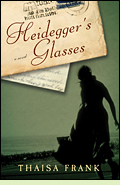|
Heidegger's Glassesby Thaisa FrankReviewed by Margaret Donsbach Elie is the mother figure to this group of the saved and incarcerated. She flirts with an SS officer who gives her food, coats, chocolate, playing cards and other confiscated miscellanies which she takes back to her charges. Her occasional secret excursions to whisk Jews out of the country terrify her lover, who tries to keep his jealousy banked and fears she will one day take one risk too many. When the project is ordered to produce a plausible answer to Martin Heidegger's incomprehensibly philosophical letter to his Jewish optometrist, an Auschwitz inmate, Elie cannot resist temptation. Her efforts spiral into her most absurd and dangerous mission yet. The converted mine is a fictional fancy. The "Curator's Notes" that open the novel feel factual but are written by a character, making it hard to tease out history from fiction. It's probably best to take the whole novel, one of the more strikingly original to be written about Nazi Germany, as allegory. It's a strong one. (2010; 336 pages) More about Heidegger's Glasses at Powell's Books or Amazon.com
The Violin of Auschwitz by Maria Angels Anglada (1994 in the original Catalan; first English edition 2010), about a violin-maker imprisoned at Auschwitz who is forced to create another instrument, despite his exhausted condition, after his profession becomes known. More info Saints and Villains by Denise Giardina (1998), about Dietrich Bonhoeffer, the German theologian killed by the Nazis after becoming involved in a failed plot to assassinate Hitler. More info Germania by Brendan McNally (2008), about four Jewish brothers, quadruplets and former vaudeville performers with psychic abilities, who are unexpectedly reunited in the turmoil surrounding Hitler during the final days of World War II. More info
Between Dignity and Despair: Jewish Life in Nazi Germany by Marion A. Kaplan (1998). More info What We Knew: Terror, Mass Murder and Everyday Life in Nazi Germany by Eric A. Johnson and Karl-Heinz Reuband (2005). More info We Survived: Fourteen Stories of the Hidden and Hunted in Nazi Germany by Eric H. Boehm (1949). More info
Examples of postcards and letters from death camps at Edward Victor's Holocaust website Back to 20th Century: Nazi Germany
|
